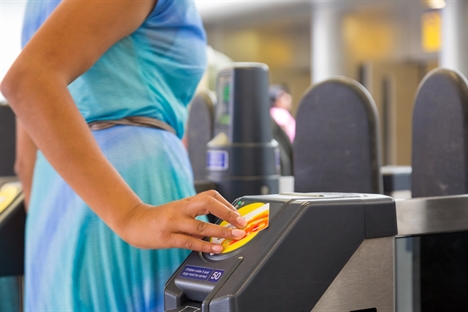23.02.16
Capitalising on contactless
Source: RTM Feb/Mar 16
Transport for London’s (TfL’s) director of customer experience, Shashi Verma, discusses the growth of contactless payment in the capital since its introduction.
In 2014, the face of retail changed forever as cashless payments overtook the use of notes and coins for the first time. This seemingly small but ultimately huge switch shows the progressive change that the UK has seen ever since the first bank cards were issued in the 1950s.
For more than 100 years, and even before then, London’s transport network has constantly been innovating ticket acceptance for travel. From the Gibson bus ticket machine of the 1930s to magnetic strip tickets in the 1960s, each revolution has helped make travelling from A to B easier while offering customers the best value fare.
Ultimately, the ‘heart’ of any innovative ticketing proposal needs to allow passengers to travel as quickly as they can, for the cheapest fare available. This was especially the focus of the introduction of the Oyster card in 2003, which allows anyone travelling in London to simply pay for the journeys they make by touching in and out on the Oyster reader at stations. Their daily travel can then be ‘capped’ to ensure people never pay more than they should.
This innovation completely changed the way people travelled – so much so that in July 2014 all London buses stopped accepting cash, as so few passengers paid this way.
Next generation of ticketing
Almost as soon as we launched the Oyster card, we instantly began looking at what the next generation of ticketing could look like. Research by the Massachusetts Institute of Technology (MIT) in America looked at a range of futuristic options, before eventually highlighting that the most beneficial method would be to incorporate ticketing into something which everyone carries on them, like a bank card.
Following close in-house development with the wider banking industry, contactless payments were trialled and launched on London Buses in December 2012.
This proved so successful that the technology was expanded to cover Tube, tram, DLR, London Overground, and most National Rail services in London in September 2014.
This world-leading technology removes the need for customers to top-up, and fares are capped – with the best value contactless fares calculated automatically.
300 million journeys
Since introduced, more than 300 million journeys have now been made using this technology, with more than a million journeys made each day using contactless.
Nearly 25,000 new cards are used on the network every day, with 27% of all pay-as-you-go journeys on Tube and rail services now made using contactless. The system is also so advanced that already contactless payment cards from more than 80 different countries have already been seen – without the need for any registration or set-up.
Along with providing customers with the best value fares on TfL services, and the vast majority of National Rail services in London, contactless payments provide ‘Monday to Sunday’ capping, which automatically limits the cost of travel over this period to the price of a weekly travel card.

Mobile device ticketing
In addition, customers are now using other methods of payment, such as mobile device ticketing technology. Around 3.5% of all contactless journeys are now made using mobile technology, with around an extra 7,000 devices now seen on average every week.
In the last six months of 2015, more than 3.2 million journeys were made using mobile devices.
This is predicted to further increase throughout 2016 as more devices come onto the market and along with other contactless technologies such as watches and wristbands with Near Field Communication (NFC) capabilities.
Next steps
Despite this huge shift towards contactless payments, we mustn’t rest or stop innovating. In the coming years, we will continue to improve the Oyster and contactless payment system to ensure it provides the best service to customers, helping us take further steps towards eliminating the use of paper tickets on the Tube.
Plans are already underway to improve the auto-refund system to help better identify where people have accidentally failed to touch out of the network. Doing so will deliver further benefits to customers, as well as reducing the need for people to phone our call centres.
By constantly innovating and looking to deliver a ticket that acts as the ‘heart’ between the customer and the transport provider, we can continue to ensure that customers get the simplest and cheapest experience while travelling on our network.
With other transport authorities across the world now looking at this technology, this philosophy must be central to the proposition if it is to be accepted and as successful as we have seen in London.
Tell us what you think – have your say below or email [email protected]